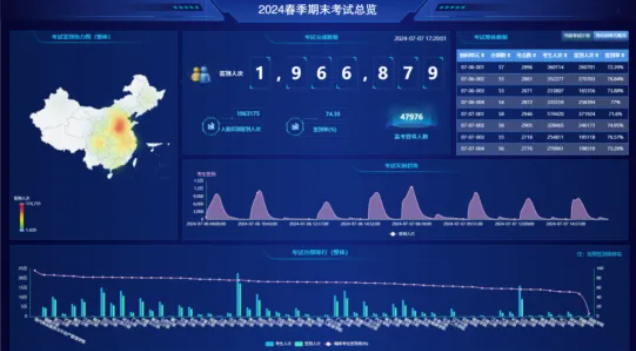 Editor's Note: General Secretary Xi Jinping emphasised at the National Conference on Education that the national education digitalisation initiative should be fully implemented, with efforts to expand the coverage of high-quality education resources and improve public services for lifelong learning.
Editor's Note: General Secretary Xi Jinping emphasised at the National Conference on Education that the national education digitalisation initiative should be fully implemented, with efforts to expand the coverage of high-quality education resources and improve public services for lifelong learning.
The Open University of China (OUC) has thoroughly implemented the educational digitalisation strategy, actively promoted the deep integration of digital technology and education, and been committed to building a ubiquitous and accessible lifelong education system. It has carried out numerous beneficial explorations in digital empowerment for lifelong learning, achieving tangible results.
To solidly advance the digital transformation of the examination work at the Open University of China (OUC), and accommodate the needs of large-scale, high-concurrency, and multi-scenario examinations while enhancing digital and intelligent service efficiency, the OUC launched a large-scale online intelligent examination system in 2022. This system empowers the entire examination management and service process, from examination planning, student registration, question bank entry, to centralised grading, through digital means. It utilises facial recognition and liveness detection for candidate identity verification, ensuring "real people take real examinations", thus supporting the smooth conduct of large-scale, high-concurrency, and multi-scenario examinations.

Command Centre for the Spring 2024 Final Examinations
Strengthening Foundations: Providing Robust Support for Large-Scale, High-Concurrency, Multi-Scenario Examinations. The Spring 2024 semester network final examinations were conducted across 3,215 examination centres nationwide, with the examination system supporting 4.296 million student examination sittings, peaking at 511,000 in a single day. The paper-based final examinations for the Spring 2024 semester took place in July, with 1.97 million examination sittings across 3,061 examination centres nationwide completing facial recognition identity verification in high-concurrency scenarios. The examination system operated smoothly, effectively preventing impersonation.
Since 2022, the examination system has supported 20 large-scale examinations (6 online examinations, 8 paper-based final examinations, 6 foreign language examinations for bachelor's degree), with a total of 43.31 million registrations, serving 17.21 million candidates.

Identity Verification at the Entrance for Spring 2024 Final Examination Candidates
Empowerment through Digital Intelligence: Persistently Advancing the Intelligent Applications of the Examination System. Firstly, the system explores and develops applications such as intelligent question generation and intelligent evaluation of subjective questions, and conducts pilot programmes and continuous iterations for certain specialties. Secondly, the upgrade of the examination command centre aims to establish a multi-tiered examination mobilisation and command system. This enhancement enables comprehensive monitoring of real-time comprehensive examination data and system operation status, providing a foundation for decision-making and assurance. Additionally, it facilitates real-time inspections of examination sites through the video surveillance system. Thirdly, the facial recognition algorithm has been upgraded to enhance accuracy. In high-concurrency scenarios where tens of thousands of facial recognition devices are operating simultaneously and millions of students are undergoing identity verification, the recognition accuracy has been improved to 99.8%.
Ensuring Security: Effectively Combating Large-Scale Technological Cheating. The examination system's renovation synchronised with network security, data security planning, construction, and operation. It continuously increases the investment in security technologies, adjusts the system security architecture, and comprehensively upgrades system logs. By focusing on prominent issues and weak links, the system undergoes continuous security reinforcement, strengthens proctor identity verification, and implements a whitelist mechanism to enhance security control capabilities and ensure comprehensive network and data security.
Going forward, the OUC will actively respond to the national and Ministry of Education's "Artificial Intelligence+" action strategic initiatives, strengthening digital support for examination management and services, and deepening the empowerment of education and teaching through artificial intelligence, with a focus on leveraging large-scale examinations as an entry point.
By Department of Digitalisation